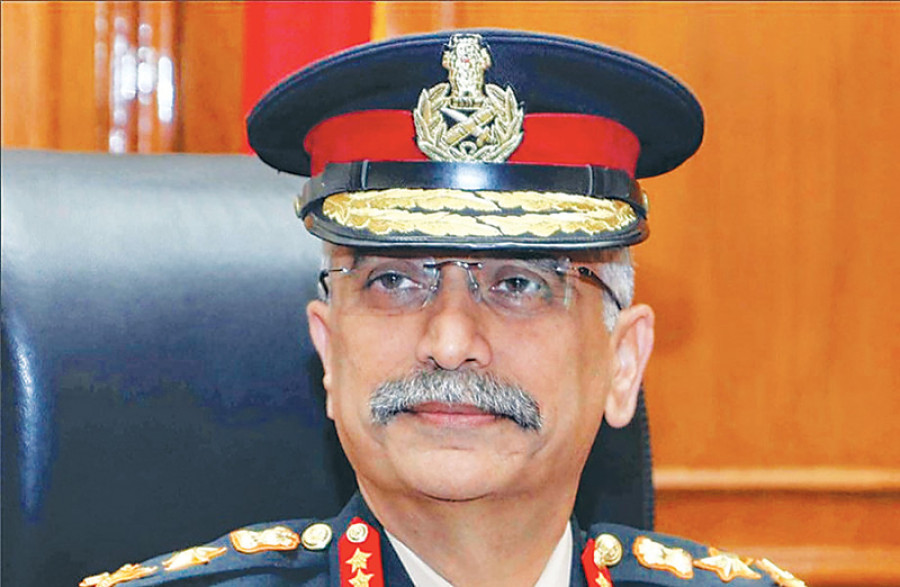National
Indian army chief to visit Nepal as neighbours attempt to normalise ties
Experts say the visit symbolises an olive branch from India and will help resume dialogue disrupted due to the border row.
Anil Giri
Officials in Kathmandu and New Delhi are preparing for a visit by India’s Chief of Army Staff General Manoj Mukunda Naravane to Nepal—the first-ever high-level visit from the southern neighbour after a border row between the two countries plunged ties to an all time low in recent history.
The stated purpose of the visit, scheduled for early November, is for Naravane to be decorated with the honorary rank of General of the Nepal Army, in accordance with a tradition of friendship between both the armies. But the implied purpose is to mend fences with Nepal, a year after the boundary dispute came to the fore, experts and two senior officials told the Post.
“In fact, it [the visit] is an olive branch from India to normalise ruptured relations due to the longstanding territorial dispute. I think this visit will positively contribute towards reviving much-needed dialogue between the two countries,” Geja Sharma Wagle, who writes on strategic affairs and foreign policy, said. “The visit is meaningful as it comes amid a diplomatic standoff between the two countries,” added Wagle.
Although the boundary dispute will not figure on the agenda of the army chief’s visit, it will open a line of communication between the two sides at highest-level and help restore normalcy, officials in touch with New Delhi over the visit told the Post.
Foreign Minister Pradeep Gyawali also told the Post that the government hopes such high-level visits will help normalise ties. “Definitely, the Indian side faced some difficulties after we published the new map,” he said. “But there is no alternative to talks. Visits of this kind will create an environment for talks on boundary dispute,” said Gyawali.
Deep Kumar Upadhyay, former ambassador to India, said the visit shows bilateral ties are gradually getting back to normal. “But we should stop unnecessarily criticising others because every state is free to exercise its sovereignty. There is no need to lash out at others,” he said.
The boundary dispute between Nepal and India had surfaced in the first week of November last year after India placed disputed Kalapani, Lipulekh and Limpiyadhura in its new political map after the revocation of Article 370 of its constitution.
This was followed by the opening of a new track by Indian Defence Minister Rajnath Singh in the first week of May in the disputed territory. Nepal then sent four diplomatic notes to India to hold talks to settle the dispute. However, as India was reluctant to sit for talks on the boundary issue, Nepal’s government issued a new map of the country incorporating the disputed territories.
A week after the opening of a 80 kilometre long track by Singh in Lipulekh on May 8, General Naravane had said that it was in fact China that was creating a flashpoint between Delhi and Kathmandu. “I don't know what they are actually agitating about. There is a reason to believe that they might have raised this problem at the behest of someone else and that is very much a possibility,” Naravane had said at an online conference in May.
His statement had created huge uproar in Kathmandu. Many officials believe that Naravane’s statement was one of the major reasons behind Kathmandu’s decision to release the new map.
After a nod from the Cabinet, Nepal Army on Wednesday announced that Naravane will visit Nepal in November. Spokesperson Brigadier General Santosh Ballav Poudyal told the Post, “We have offered two dates to the Indian side for the visit,” he said, adding that it was highly likely that the Naravane will land in Kathmandu in the first week of November.
The visit, approved by the government of Nepal on February 3, had been postponed due to the Covid-19 lockdown in both the countries, the army said in a statement. During the visit, President Bidya Devi Bhandari will confer the honorary rank of General of the Nepal Army to Naravane amid an investiture ceremony, the army said in a statement.
A senior official told the Post that the visit would likely take place from November 3-5. During the visit, Naravane will pay a courtesy call on President Bhandari, will meet Vice President Nanda Bahadur Pun, Prime Minister KP Sharma Oli and his Nepali counterpart General Purna Chandra Thapa, among others. “We are preparing a schedule for his visit to Muktinath. But it is too early to confirm,” sources said.
The visit, although symbolic, highlights the importance of military diplomacy between the two countries, said Sharma. “As both the Nepali and Indian army have, to some extent, diplomatic leverage on their respective governments,” said Wagle, “It is worth noting that the Nepal Army played an instrumental role in lifting the Indian blockade in 2015.”




 21.12°C Kathmandu
21.12°C Kathmandu














